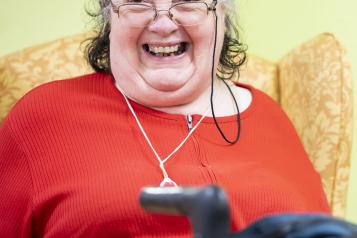Independent report demands action on care of people with learning disabilities

Sir Stephen Bubb, chief executive of charity leaders body ACEVO, was asked by NHS England to work with stakeholders and make recommendations for the development of a national commissioning framework to address the serious shortcomings in the provision of support for people with learning disabilities.
Sir Stephen chaired an independent group who developed the report, “Winterbourne View – Time for Change”, with guidance and expertise from healthcare professionals, the voluntary sector, local government and people with learning disabilities, their families and carers.
Sir Stephen’s report makes a series of recommendations for the NHS, local government, regulators and the government, that include a robust NHS commissioning framework to support people with learning disabilities and autism move out of hospitals and into the community.
“We asked Sir Stephen to tell us how the NHS can better plan and fund care, treatment and support for people with learning disabilities and autism. He’s done that.
“This report asks every part of the system to respond. We are committed to playing a full and active role in the implementation of the recommendations and call on others to do the same.”
“The Winterbourne View scandal shocked the nation. People are still angry and frustrated that more people with learning disabilities are being placed in institutional care than moved into the community.
“We urge immediate action, to close all Winterbourne-style institutions and ramp up community provision. We need a new Charter of Rights to empower people with learning disabilities and their families, and give them the right to challenge the system. We need that system to have the courage to act on these recommendations, and not to promise another false dawn. The time for talk is over. It’s time for people with learning disabilities or autism and their families to be put first.”
The report sets out ten recommendations that include:
- the introduction of a Charter of Rights for people with learning disabilities and/or autism and their families;
- giving people with learning disabilities and their families a ‘right to challenge’ decisions and the right to request a personal budget;
- a requirement for local decision-makers to follow a mandatory framework that sets out who is responsible, for which services and how they will be held to account, including improved data collection and publication;
- a planned closure programme of inappropriate institutional in-patient facilities supporting patient choice;
- improved training and education for NHS, local government and provider staff; and
- the founding of a social investment fund to build capacity in community-based services.
“NHS England’s recent work with people with learning disabilities, and this new report, all now prove that radical changes are needed in NHS and social care, so that people with learning disabilities and their families increasingly take control of how the services they want and need are provided. This will mean challenging legacy models of institutional care, a shift in power via our new offer of personal budgets and Integrated Personal Commissioning, as well as broader action on employment rights and opportunities.”
Progress has been slow but NHS England has introduced the collection and publication of quarterly data to track progress on transferring people to community settings, which for the first time identifies areas that need additional support. Latest figures show an increase in the number of people with a transfer date from hospital to the community.
All local NHS leaders must now have a register of inpatients with learning disabilities and autism to inform local plans, and NHS England is currently undertaking a programme of Care and Treatment Reviews, which looks at whether a patient is receiving the right care, in the right place and takes into account what the patient wants. NHS England expect about 1,000 reviews, which are supported by experts by experience, expert clinicians, NHS and local authority commissioners, to have taken place by the end of the year.
“The horrors of Winterbourne View exposed serious failures in the care of people with learning disabilities and autism and this report makes clear commissioning needs to change radically if services are to improve.
“It is unacceptable for people with learning disabilities and autism to be left in institutions if they can live in their own home or in the community. I am going to consult on changing the law to speed up delivery of the Winterbourne View commitments – to see people living in the community wherever possible and able to challenge decisions about their care.
“I welcome the thrust of Sir Stephen Bubb’s report”.


